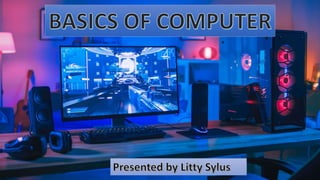Basics of Computer.pptx
•Download as PPTX, PDF•
1 like•11 views
computer-parts-components-characteristics-limitations-types-input device-output device-storage device
Report
Share
Report
Share

Recommended
Recommended
More Related Content
Similar to Basics of Computer.pptx
Similar to Basics of Computer.pptx (20)
Lecture#2-Featuers of Computers in modern technology and its benefits

Lecture#2-Featuers of Computers in modern technology and its benefits
INTRODUCTION TO INFORMATION TECHNOLOGY -SARASWATHI RAMALINGAM

INTRODUCTION TO INFORMATION TECHNOLOGY -SARASWATHI RAMALINGAM
Recently uploaded
TEST BANK For Principles of Anatomy and Physiology, 16th Edition by Gerard J. Tortora, Verified Chapters 1 - 29, Complete Newest Version.TEST BANK For Principles of Anatomy and Physiology, 16th Edition by Gerard J....

TEST BANK For Principles of Anatomy and Physiology, 16th Edition by Gerard J....rightmanforbloodline
Recently uploaded (20)
The Zero-ETL Approach: Enhancing Data Agility and Insight

The Zero-ETL Approach: Enhancing Data Agility and Insight
UiPath manufacturing technology benefits and AI overview

UiPath manufacturing technology benefits and AI overview
DEV meet-up UiPath Document Understanding May 7 2024 Amsterdam

DEV meet-up UiPath Document Understanding May 7 2024 Amsterdam
Six Myths about Ontologies: The Basics of Formal Ontology

Six Myths about Ontologies: The Basics of Formal Ontology
Vector Search -An Introduction in Oracle Database 23ai.pptx

Vector Search -An Introduction in Oracle Database 23ai.pptx
Intro to Passkeys and the State of Passwordless.pptx

Intro to Passkeys and the State of Passwordless.pptx
API Governance and Monetization - The evolution of API governance

API Governance and Monetization - The evolution of API governance
Web Form Automation for Bonterra Impact Management (fka Social Solutions Apri...

Web Form Automation for Bonterra Impact Management (fka Social Solutions Apri...
TEST BANK For Principles of Anatomy and Physiology, 16th Edition by Gerard J....

TEST BANK For Principles of Anatomy and Physiology, 16th Edition by Gerard J....
Tales from a Passkey Provider Progress from Awareness to Implementation.pptx

Tales from a Passkey Provider Progress from Awareness to Implementation.pptx
ChatGPT and Beyond - Elevating DevOps Productivity

ChatGPT and Beyond - Elevating DevOps Productivity
Why Teams call analytics are critical to your entire business

Why Teams call analytics are critical to your entire business
Elevate Developer Efficiency & build GenAI Application with Amazon Q

Elevate Developer Efficiency & build GenAI Application with Amazon Q
Basics of Computer.pptx
- 2. What is a Computer? The computer is an electronic device which is developed by Charles Babbage in nearly the 19th century. It takes input data from the input devices stores and processed it and produces output. Input Process Output
- 4. Components of computer • Hardware Input devices Output devices Storage devices CPU • Software Application software System software
- 5. Characteristics or capabilities of computer • Speed - A computer works with much higher speed and accuracy compared to humans while performing mathematical calculations. Computers can process millions (1,000,000) of instructions per second. The time taken by computers for their operations is microseconds and nanoseconds. • Accuracy - Computers perform calculations with 100% accuracy. Errors may occur due to data inconsistency or inaccuracy.
- 6. • Storage - The Computer has an in-built memory where it can store a large amount of data. You can also store data in secondary storage devices such as floppies, which can be kept outside your computer and can be carried to other computers. • Quick Decision - The computer does its work as soon as you give instructions to the computer, the computer starts executing the instruction. • Reliability - is the quality due to which the user can stay dependable on the computer. Computers systems are well-adjusted to do repetitive tasks.
- 7. Limitations of Computer • Lack of Common-Sense - Common sense is also the major limitation of the computer, as you all would know that a computer works on the instructions of humans. A computer is designed in such a way that it works only on logic and not on common sense. • No IQ - No IQ is also one of the basic computer limitations. No IQ means that the computer does not have brains like humans. Simply say that computer systems do not have the ability to think and understand. • No Feelings - Emotion or feelings is also one limitation of a computer. We are not computers like humans because computers are machines.
- 8. • Computers Can’t Decide - Like us humans, computers do not have the ability to make decisions. In these cases, human is ahead of the computer. Computer systems only work on logic, not on judgment. • Computers Can’t Think - A computer is a machine, so the computer cannot think like us humans and the computer does not do any work by thinking because the computer does not have the ability to think.